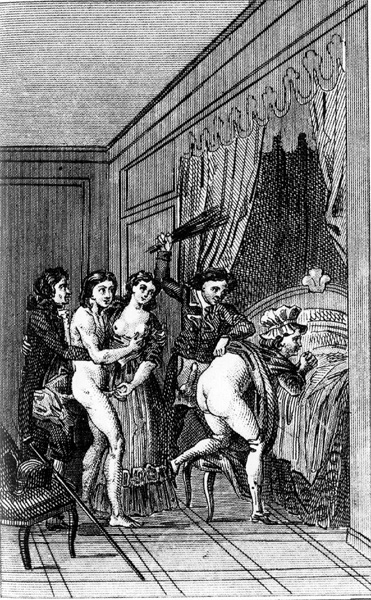|
November 11, 2004
The engraving below is taken from the 1789 Dutch edition of "The story of Juliette" and the 1797 edition of "The story of Justine".
 A biography of the Marquis de Sade. A biography of the Marquis de Sade.
During his 13 years of imprisonment he penned a number of pornographic texts that he published in the period after his release. This works include The 120 Days of Sodom, Justine (or the Misfortunes of Virtue), and Philosophy in the Boudoir. The is use value of these have been treated as akin to the value of excrement.
There is a post on de Sade over at Junk for Code. This argues that the body, seen as a constellation of pleasures and pains determined by desires, instincts, and appetites, is central to aesthetic discourse. On this account:
"....the aesthetic is a rebellion against the rational scientific enlightenment, the valorization of systematic theory, and the focus on the mind. This rebellion is marked by de Sade and then continued by Bataille, Genet, Klossowski, and Artaud. Here language sings the glory and pain of the polymorphously perverse."
Eroticism is the individual technic of sovereign values which Bataille opposes to utility. Eroticism destroys thedualism between subject and object and its politics, are contrary to the interests of the state the subject of excessive desire breaks away from all restraints" and annihilates form.
De Sade has appeared before in this weblog in the form of drawings by Hans Bellmer and in relation to Bataille. Bataille's text, The Use Value of de Sade from Visions of Excess is in the library but the links are no longer working.
In a 1951 essay, "Must We Burn Sade," Simone de Beauvoir identifies Sade as a forerunner of Freud with an intuitive grasp of the human subjectivity with an understanding of sexual perversion:
"It is remarkable, for example, that in 1795 Sade wrote: ‘Sexual pleasure is, I agree, a passion to which all others are subordinate but in which they all unite.’ Not only does Sade, in the first part of this text, anticipate what has been called the ‘pansexuality’ of Freud, but also he makes eroticism the mainspring of human behavior. In addition, he asserts…that sexuality is charged with a significance that goes beyond it. Libido is everywhere, and it is always far more than itself. Sade certainly anticipated this great truth. He knew that the ‘perversions’ that are vulgarly regarded as moral monstrosities or physiological defects actually envelop what would now be called an intentionality. He understood, too, that our tastes are motivated not by the intrinsic qualities of the object but by the latter’s relationship with the subject. In a passage in La Nouvelle Justine he tries to explain coprophilia. His reply is faltering, but clumsily using the notion of imagination, he points out that the truth of a thing lies not in what it is but in the meaning it has taken on for us in the course of our individual experience. Intuitions such as these allow us to hail Sade as a precursor of psychoanalysis."
De Sade is more than a precursor of psychoanalysis. That makes him safe, like the merely literary defense of de Sade. De Sade represents the excesive difference that must be expelled from the same in order for the same to be the same. In bodily terms: excretions of all kinds; in the body-politic: sacrifice and the sacred.
Update
That's a Bataillian reading. What the heck. Bataille and Klossowski understood that de Sade poses a challenge to the progressive, emancipatory Enlightenment understanding of technology and development that we still live inside in Australia. de Sade provides us with an entry into grasping the nightmare of the Enlightenment's destruction in the 20th century: to begin to grasp and understand the way rationalism embraces and becomes evil, whilst remaining good.
|
